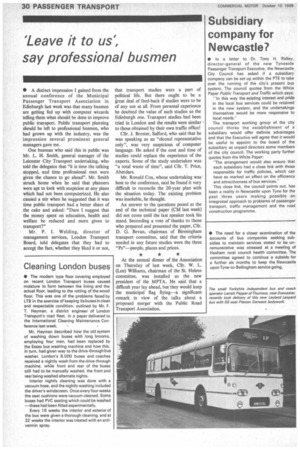'Leave it to us', say professional busmen
Page 32

If you've noticed an error in this article please click here to report it so we can fix it.
• A distinct impression I gained from the annual conference of the Municipal Passenger Transport Association in Edinburgh last week was that many busmen are getting fed up with computer wizards telling them what should be done to improve public transport. Public transport planning should be left to professional busmen, who had grown up with the industry, was the impression several prominent general managers gave me.
One busman who said this in public was Mr. L. H. Smith, general manager of the Leicester City Transport undertaking, who told the delegates that "it is time the talking stopped, and time professional men were given the chance to go ahead". Mr. Smith struck home when he said that planners were apt to look with suspicion at any plans which had not been computerized. He also caused a stir when he suggested that it was time public transport had a better share of the cake and asked: "Dare I suggest that the money spent on education, health and welfare be reduced and more given to transport?"
Mr. P. I. Welding, director of management services, London Transport Board, told delegates that they had to accept the fact, whether they liked it or not,
that transport studies were a part of political life. But there ought to be a kreat deal of feed-back if studies were to be of any use at all. From personal experience he doubted the value of such studies as the Edinburgh one. Transport studies had been tried in London and the results were similar to those obtained by their own traffic office!
Cllr. J. Broster, Salford, who said that he was speaking as an "elected representative only", was very suspicious of computer language. He asked if the cost and time of studies could replace the experience of the experts. Some of the study undertaken was "a total waste of time", said Cllr. T. Price, Aberdare.
Mr. Ronald Cox, whose undertaking was host to the conference, said he found it very difficult to reconcile the 20-year plan with the situation today. The existing problem was insoluble, he thought.
An answer to the questions posed at the end of the technical paper (CM last week) did not come until the last speaker took his stand_ Seconding a vote of thanks to those who prepared and presented the paper, Cl1r. D. G. Bevan. chairman of Birmingham transport committee, said that the criteria needed in any future studies were the three "Ps"—people, places and prices.
At the annual dinner of the Association on Thursday of last week, Cllr. W. L. (Len) Williams, chairman of the St. Helens committee, was installed as the new president of the MPTA. He said that a difficult year lay ahead, but they would keep the municipal flag flying—a significant remark in view of the talks about a proposed merger with the Public Road Transport Association.
























































































































